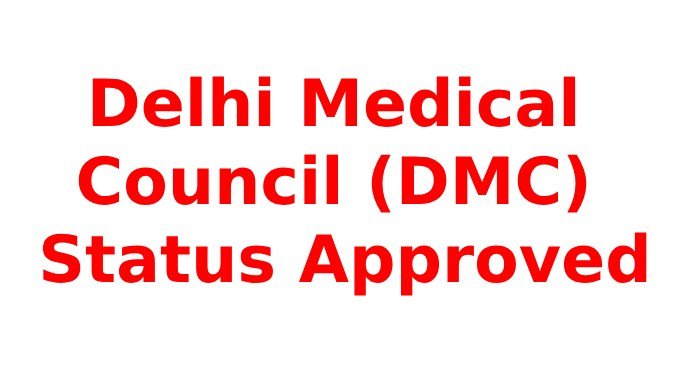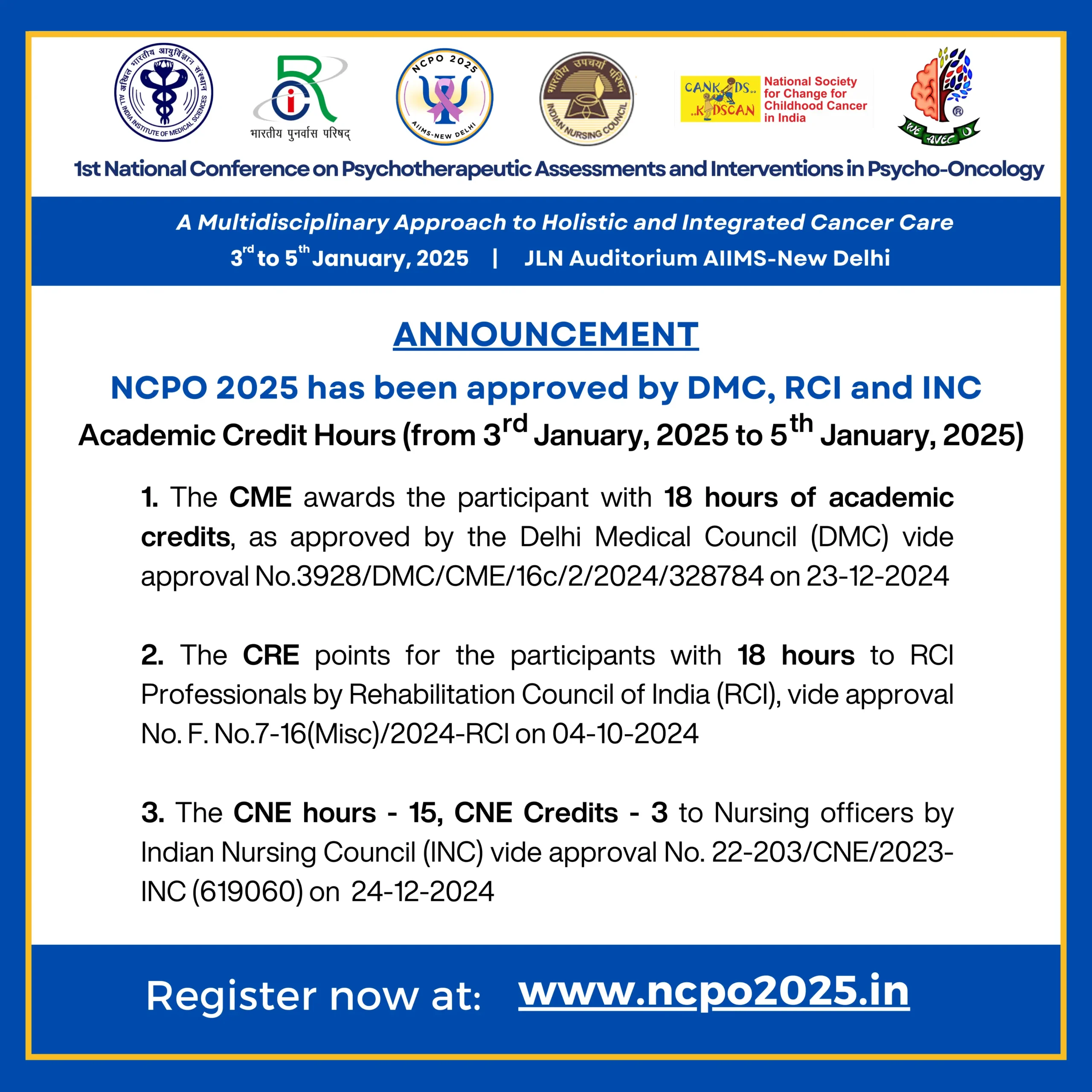About AIIMS
The Department of Psychiatry
The Department of Psychiatry had informal beginning in 1958, when Dr. Luvia Taylor Gregg, Honorary Consultant in Psychiatry, began formal teaching in psychiatry for the first batch of MBBS students. Dr Gregg planned to introduce 100 hours of teaching in psychiatry in MBBS curriculum. Prof KL Wig, the then Head, Department of Medicine (later Director, AIIMS) was instrumental in integrating teaching of psychiatry throughout the clinical posting in medicine, so that the exposure to psychiatry was spread to all the 3 years on weekly basis. DrVimlaVirmani, who later headed the Department of Neurology, also worked as clinical tutor in the initial years of the Department history.
Dr AS Mahal joined as Assistant Professor in 1962 and Dr D Satyanand as Professor and Head in Aug 1963. Regular MD Psychiatry programme in psychiatry, the first in the country was started in 1964 by DrSatyanand. During 1967-1968, Dr Erna Hoch, a Swiss psychiatrist, who had migrated to India, headed the Department as Honorary Professor and Head for about one and half year. She was followed by Dr JS Neki, who joined in Sept 1968 as Professor and Head.
The Department of Psychiatry had a number of firsts in India besides being a pioneer in establishing postgraduate training in psychiatry in general hospital setting. The department gave a stature to psychiatry as medical discipline in a medical institution in India. Another path braking contribution of the department of psychiatry was initiating rural mental health services, through the Indian Council of Medical Research funded mental health project at the Ballabgarh Community Centre in 1964. The department has also the credit of starting the first Child Guidance Clinic in Delhi in 1964 and De Addiction Centre in 1988 which got the status of the National Drug Dependence Treatment Centre (NDDTC) in 1988. NDDTC is also a WHO Collaborating Centre on Substance Abuse.
The Department of Psychiatry has been a pioneer in providing mental health services in a General Hospital Setting. The department runs regular out-patient and in-patient services and multiple Specialty clinics along with Community services, Consultation liaison services and Emergency psychiatric services. In addition to medical management, psychological treatments, modified electro convulsive therapy (MECT), rTMS, tDCS and biofeedback are routinely provided. During the year 2017-18, the department provided out-patient consultation services to a total of 17,204 new cases and 66,333 follow up cases. The department is at the forefront of medical education with courses for MBBS, B.Sc/M.Sc nursing, MD (Psychiatry) and PhD (Clinical Psychology). The department undertakes regular collaborative research with national and international agencies like World Health Organization (WHO), University of California, National Institute of Health Research (UK), ICMR, and organizes year round public educational events for awareness and promotion of mental health.
Currently primary mandate of the department is to develop highly trained manpower, curriculum and techniques for undergraduate and postgraduate medical education. Funded research on epidemiology of substance abuse along with general mental health morbidity has been the main focus. The postgraduates are trained through outpatient, inpatient, community based and family centred mental health care.
Department of Medical Oncology
Department of Medical Oncology excels in clinical, teaching and research activities. From its inception in 1984, work-load has consistently increased: currently out of about 70,000 cases registered at IRCH per year, medical oncology manages about 37,000 by itself. In addition, medical oncology department is involved in patient care services in different clinics – including breast, Gastroenterology, Head & Neck Surgery & ENT, Pediatric oncology, Pediatric Surgery, lung cancer, ophthalmic Ca, Bone & soft tissue & Urology clinic. It has a very busy day care service where around 60 patients are managed per day. In addition, patients are admitted in the regular ward also, more than 7000 patients get chemotherapy on an outpatient basis and OPD based procedures are carried out 3 times a week.
Medical Oncology department is running a DM and PhD programme
This department has its own laboratory where many of the technologies such as RT- PCR, FISH, cytogenetics, tissue culture, and Flowcytometry etc. have already been standardized. Stem cell storage is carried out; routinely also blood component therapy is provided with the help of cell separator.
This is one of the few centres in the country to have established hematopoietic stem cell transplant programme. About 350 transplants have already been carried out to treat malignant and non-malignant hematological disorders. In collaboration with Department of CTVS, stem cell transplant program has been extended to treat myocardial Ischemia also. Currently, phase II studies are also being performed in collaboration with Dr. R.P. Centre and paediatric surgery to explore role of stem cells in the treatment of Retinitis pigmentosa and spina bifida.
We have also investigated an alternative source of hematopoietic stem cells namely fetal liver. Here in, we have demonstrated the secretion of certain cytokines which induce recovery in aplastic anemia patients.In addition, Department has spearheaded a program to reach out to the communities for cancer awareness and cancer detection. Doctors and paramedical staff of neighbouring states and Delhi have been trained. Screening program for common cancers in Urban slum dwellers have been conducted and over 10,000 people have been screened.
Medical Oncology has been actively working with various NGO’s to increase cancer awareness in schools and in the communities. Medical oncology faculty has been participating in many Continuing education programs/workshops/symposia conducted by Medical Oncology on various topics regularly over the last several years including hemato-oncology, cancer screening and awareness, lung cancer, cancer team management, colorectal cancers, hematopoietic stem cell transplants etc. Many of these program were funded by WHO.
Medical Oncology has also taken the initiative to carry out research in our traditional methods, namely Pranayam, yoga, meditation and Sudershan Kriya. Research has shown beneficial effects of these techniques on brain, endocrine system and immune system. Antioxidant defence also improved following these practices. International Symposium was organized in 2002 at AIIMS to discuss these findings. Several faculty from within and outside country made their presentations, program was attended by more than 1000 participants. An International Conference on ‘Expanding Paradigms: Science, Consciousness and Spirituality’ was also organized in February, 2006 at New Delhi on this subject. Several faculty members within and outside country made their presentations and there were approximately 1500 participants.
Medical Oncology has also investigated the role of antioxidant vitamins to treat lung cancer. This is a rather innovative area of research; part of the work has already been published.
Department of Onco-Anaesthesia and Palliative Medicine
The Services of Onco-Anaesthesiology, Critical Care, Pain and Palliative Medicine is an integral part of Dr BR Amedkaer Institute Rotary Cancer Hospital and National cancer Institute, All India Institute of Medical Sciences, New Delhi. The unit has grown over the years to provide holistic pain management of the whole of this cancer centre in addition to providing anesthesia, Intensive care and Palliative Medicine services. The Unit of Anesthesiology was upgraded to Department of Onco-Anaesthesia and Palliative Medicine in June 2015. The Department is headed by Dr (Prof) Sushma Bhatnagar. The department have well trained faculty (Dr Sushma Bhatnagar, Dr Seema Mishra, Dr Rakesh Garg, Dr Nishkarsh Gupta, Dr Vinod Kumar, Dr SachidanandJeeBharati, Dr BrajeshRatre) and provide services to anesthesiology, intensive care, pain and palliative care. All of them are professionally qualified anesthesiologists and critical care physicians and have gained experience as palliative care personnel in the advanced cancer patients referred for pain and other symptom management.
The mission of the Department is to provide state-of-art and comprehensive care for patients with cancer with both curative and palliative intent. It includes services for various diagnostic interventions, surgical procedures, pain and palliative procedures. The department provides round the clock services for acute and chronic pain management as well. The department has six bedded intensive care unit which provides care for critically ill patients and six bedded palliative care ward for palliative care of oncology patients.
Since the inception of the unit way back in 1990s, the unit has grown in all aspects of the care including anaesthesia, intensive care, pain and palliative care. Because of the holistic contribution and increase in faculty strength, unit was upgraded to department. The Department has its regular academic activities and also pursuing various research activities in the fields of Cancer Pain, Palliative Care and Perioperative Medicine for proposed benefits for the patient. These research activities provides beneficial. The department has developed protocol and has structured SOPs for better patient management. The department organizes CMEs, conferences and workshops on regular basis. The unit also organizes certificate course in Palliative Care twice a year in the month of June and November and Foundation course on Palliative care once in a year in the month of February.
The department provides comprehensive care for the surgical procedures. We have pre-anaesthetic clinic for preoperative evaluation and optimization for surgical interventions. The operating rooms are well equipped with state-of-art infrastructure including anesthesia workstations and other ancillary equipments like invasive monitoring devices, intubating fiberscope, ultrasound machines etc. The centre has well equipped recovery area providing immediate care to postsurgical patients. All surgical patients receives acute pain management services round the clock supervised by the faculty. Our department provides point of care technology with ultrasound for diagnostic (vascular access, nerve blocks, volume responsiveness assessment, and for therapeutic purposes (pleurocentesis, optimization of cardiovascular function in various types of shock) in the operating room, palliative care ward and Intensive care
The department provide emergency services including airway management and ventilatory support to patients admitted with other specialties like surgical oncology, medical oncology and radiation oncology. The services for management of pain due to chemotherapy or radiation therapy are also provided to these departments round the clock.
The intensive care unit is six bedded and provide care for patients after the surgery and critically ill patients from surgical oncology, medical oncology and radiation oncology departments. The ICU is well equipped with state-of-art technology and human manpower. The nursing staff and physiotherapist are well trained and provide care round the clock.
We have also run OPDs 6 days in a week where we examine and treat cancer pain patients and admit patients if required to the palliative care. In theses OPDs we also patients for pre anesthesia check ups. The six bedded palliative care unit provides total in-hospital care to cancer patients for palliative care management. The ward has an adjoining procedure room which provides well equipped place for interventions in palliative care patients for symptom and pain management. The ward has well trained nursing staff and physiotherapist for improving the quality of life for cancer palliative care.
The department has been sanctioned two academic courses – and first batch of these DM and MD candidates started from January 2016. The department also organizes certificate course in Palliative care every six months.
The department has been designated as WHO collaborating centre for Training and and Education in Palliative Care (WHO CC IND-163).
The department had been designated as ESMO Designated Centre of Integrative Oncology and Palliative Care.
College Of Nursing
VISION:
To be a global leader in nursing education, research, and practice, fostering innovation,
compassion, and excellence in healthcare, and preparing nursing professionals who will
advance health equity and contribute to the well-being of society
MISSION:
- To provide high-quality, evidence-based nursing education that integrates theory, practice, and research.
- To develop competent, compassionate, and ethical nursing professionals who excel in patient-centered care and leadership.
- To foster an environment that encourages critical thinking, lifelong learning, and interdisciplinary collaboration in healthcare.
- To advance nursing research that improves patient outcomes, healthcare delivery, and the health of communities, nationally and globally.
- To actively contribute to health policy and leadership in national and international nursing
- Educational Excellence: To provide innovative, student-centered education that develops competent, confident, and compassionate nursing professionals.
- Research and Scholarship: To promote and conduct high-quality research that advances nursing science influences health policy, and improves clinical practices.
- Clinical Practice and Leadership: To prepare nurses for leadership roles in healthcare through rigorous clinical training, fostering critical thinking, decision-making, and ethical practice.
- Community and Global Health Engagement: To promote community-based and global health initiatives that empower nurses to address health disparities and improve population health.
- Interdisciplinary Collaboration: To encourage collaboration across disciplines, enabling nurses to work effectively within diverse healthcare teams to provide holistic, patient-centered care.
- Lifelong Learning: To foster a culture of continuous education and professional development among nursing students, faculty, and practicing nurses.
- Policy and Advocacy: To prepare nurses to influence and advocate for health policy changes that benefit patients, healthcare systems, and the nursing profession.





